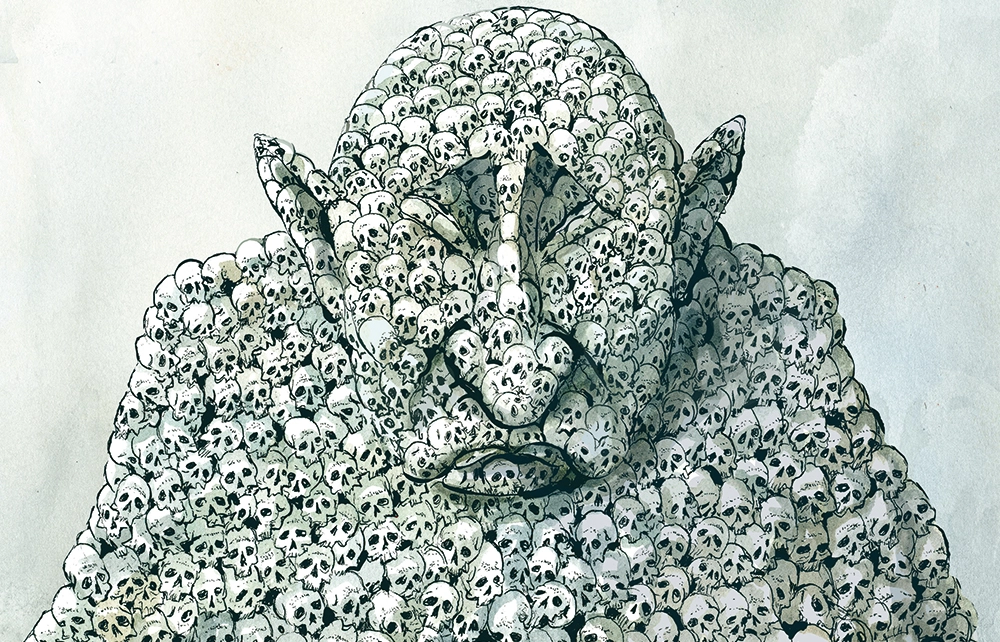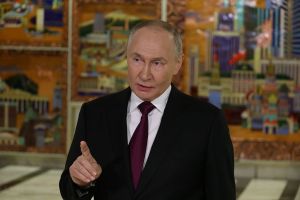It is a full year since Vladimir Putin started his latest war against Ukraine, and only optimists expect that the next anniversary will occur in peacetime. There is little comfort to be taken from the twin possibilities of victory or defeat for the Ukrainian forces. If they win, Russia will remain a potent threat on their borders even though Putin would be likely to fall from power. And if Ukraine loses, it will sink back into the corruption and maladministration that plagued the country before 2022 — with the additional curse of a Russian colonial oppression.
Many people had assumed that such invasions could no longer be perpetrated by one European state against another. But it did not shock opinion in the countries of Eastern Europe that broke away from the USSR’s grasp in 1989. Their peoples never believed in the permanent benevolence of the new Russia. Throughout the 1990s, these countries badgered the US administration to ease their entry into NATO. Away from the TV cameras, the rough talk of Russian diplomacy had taught them the importance of obtaining a wall of security while Russia was in a stage of economic distress. American leaders, far from compelling Eastern Europe to join the alliance, were wary of unduly annoying Russia.
In the early 2000s, when the boom in oil and gas prices restored the Russian economy, the Kremlin returned to questions of Russia’s frontiers. Eastern Ukraine, eastern Estonia and northern Kazakhstan all have large numbers of Russian-speaking inhabitants; Russian rulers see no reason why they should not heavily influence — and perhaps even govern — them again.
The Ukraine war is Putin’s war. He teased his own security council by not revealing his aggressive plans in the week before he launched it. It had been the same before the strike against Crimea in 2014, when he did not bother to alert prime minister Dmitri Medvedev or foreign affairs minister Sergei Lavrov about what he intended. Putin’s personal dominance is unmistakable at the apex of political power. Like Stalin, he treats his ministers as errand boys. He shows some insecurity only when he sits down with them and, fearful of catching Covid, perches himself at the other end of an extraordinary long table.
But while his decision on war took nearly everyone by surprise, he could not have made it unless he could depend on a reservoir of public support. In the year 2000, when Putin became president, the Russian political elite wanted a strongman who would restore Russia’s influence on the rest of the world. They hated how America, overlooking Russian objections, led its armed forces into former Yugoslavia and Iraq. They yearned for the business “oligarchs” to be brought to heel. They also resented the growing evidence that some parts of the old USSR were hoping to partner with the US and the EU. They wanted to make Russia great again.
In carrying out this agenda, Putin achieved a soaring popularity at home even while his reputation tumbled abroad. Foreign leaders were slow in breaking cover with their private impressions because they hoped that his bark was worse than his bite — he was downright rude to them in negotiations and sometimes, as Tony Blair discovered, even at press conferences.
Western leaders limited themselves to occasional verbal admonition and to the application of economic and sporting sanctions. After the invasion of Georgia in 2008, Russia received a financial slap on the wrist. After Crimea was annexed in 2014, the sanctions were reinforced but the Russian economy survived the punishment. Indeed, Putin gloried in the incentive for Russians to ignore international trade embargoes and achieve technological self-sufficiency. He was pleased that Angela Merkel did not feel it necessary to call a halt to Nord Stream 2. In the UK, the poisoning of Sergei Skripal increased the field of economic sanctions but failed to halt the use of London as the global laundromat for Russian dirty money.
Most stupendously, Russian hackers interfered in the 2016 American presidential election in Donald Trump’s favor. No wonder Putin concluded that Western leaders were more interested in cohabiting with his Russia than in challenging it. In 2021 came the apparent proof of the decline of the West when the US and its allies scuttled from Afghanistan.
That summer, when the US encouraged Ukraine to apply for membership of NATO, Putin was determined to strike while the iron was hot. He had had enough of the Zelensky administration in Kyiv with its privileging of the Ukrainian language in politics and administration. Zelensky, coming to power in 2019 with a mandate to seek a compromise with Russia, had increasingly adopted a less accommodating posture. Russian speakers in eastern Ukraine were far from wanting a break with Moscow and anyway, in Putin’s estimation, Ukraine was essentially an artificial state which could be blown over by a mere puff of Russian wind. By then, unlike in 2014, he could count on support from Lukashenko’s Belarus. What could possibly go wrong?
Putin should have known better when it came to the Ukrainians. He was probably ill-informed by his intelligence services about Ukraine’s potential for resistance. But truly he got the FSB that he deserved. He had stripped out from its leadership those who dared tell truth to power. He overestimated the Russian Army too. After Georgia in 2008, he had poured finance into modernising Russia’s fighting capacity but failed to eliminate the patterns of poor organization. He himself was too devious by half, pretending that he was ordering only ‘a special military operation’ and not a full-scale war.
When the Ukrainians stopped his tanks from occupying Kyiv in March 2022, he learned that his strategic prospectus — based on months of terrifying intimidation from the Russian and Belarusian frontier followed by an uncontested advance on the Ukrainian capital — was woefully misplaced. The trouble for him personally was that he had invested too much personal capital in victory to be able to withdraw with any hope of surviving in power.
He had also underestimated the NATO members’ willingness to give military support to Ukraine. He must have expected an increase in economic sanctions, but perhaps it surprised him that Germany under Olaf Scholz would abrogate the Nord Stream II agreement and seek its fuel supplies elsewhere. He had also not anticipated, after years of diplomatic bromance with Xi Jinping, the severity of Chinese warnings against the use of tactical nuclear weaponry in Ukraine. It is true that China and many other countries, including Hungary in Europe, remain stubbornly unwilling to break with Putin, but the fact remains that Russia’s active support is confined to Belarus, Iran and North Korea.
For now, Putin remains unchallenged at the peak of Russian power. In early 2022, the leaders of Russian big business politely advised him against going to war. But he ignored them and they have as yet stayed timid and silent. At the security council immediately before the outbreak of war, there were obvious signs of disquiet about Putin’s truculence. But he enforced a theatrical display of compliance, and there is no trace of an attempted coup against him.
Russian public opinion has not turned against him either. A quarter of a million mainly educated and liberal Russians have fled the country rather than live without freedom or be forced to fight an illegal war. Putin called them scum just as Lenin did in the early 1920s. Mass conscription has not met with serious resistance despite the growing number of serving Russians who have perished in the fighting in Ukraine. In the mid-1980s, Mikhail Gorbachev read out letters from mothers of dead or wounded sons in the Afghan war to persuade the communist leadership to pull out of Kabul. Putin is not going to do the same. But there is always the possibility that the Russian people will again take to the streets. When autocracies crack asunder, it usually takes everyone by surprise.
But the Ukrainian side cannot, alas, depend on Russia itself crumbling. Even if Putin dies or is removed from power, as long as the current political elite stays in power his successor is likely to want to interfere in Ukraine. The most prominent pro-Western Russian politicians have been killed, imprisoned or shoved into emigrating; a surrender of occupied Crimea and eastern Ukraine would require a tremendous somersault in official Russian policy. Any future Russian leader would predictably aim to divide Ukrainians among themselves. While some, especially in the western provinces, maintain intense hostility to any compromise with Russia, others are more accommodating. The pressures of war have only temporarily suspended such debates.
Ukraine also has to cleanse its administration and business of the appalling corruption that is a barrier to the country’s entry to the EU. The Ukrainian leadership’s indulgence of the memory of Stepan Bandera, a violent antisemitic and anti-Polish militant who allied with the Third Reich, will need to be definitively eliminated. The economic rebuilding of the country after the war, moreover, will require decades of effort and endless Western support.
Remarkably, though, these uncomfortable factors are being tackled by Ukrainians even while they fight a foreign enemy with superior domestic resources. Complete military victory may well be outside Ukraine’s grasp: we are yet to see. But they have some resources unavailable to Russia. They have a heroic determination to see the struggle through to the end. Their morale is toughened, not diminished, by setbacks in battle. Millions of Ukrainians who were reluctant to condemn Putin have been taught a terrible lesson by twelve months of murderous Russian attacks. Young Ukrainian men are proud to enlist.
While this situation prevails and while the Ukrainian people can call on military supplies from abroad, Kyiv and its exceptional president will continue to prove to the world that it is not an artificial state but a country that will fight its way towards a triumphant peace. The terms of such a peace cannot be foreseen, but the Ukrainians have won the right to have the decisive influence in defining them.
This article was originally published on The Spectator’s UK website.

























